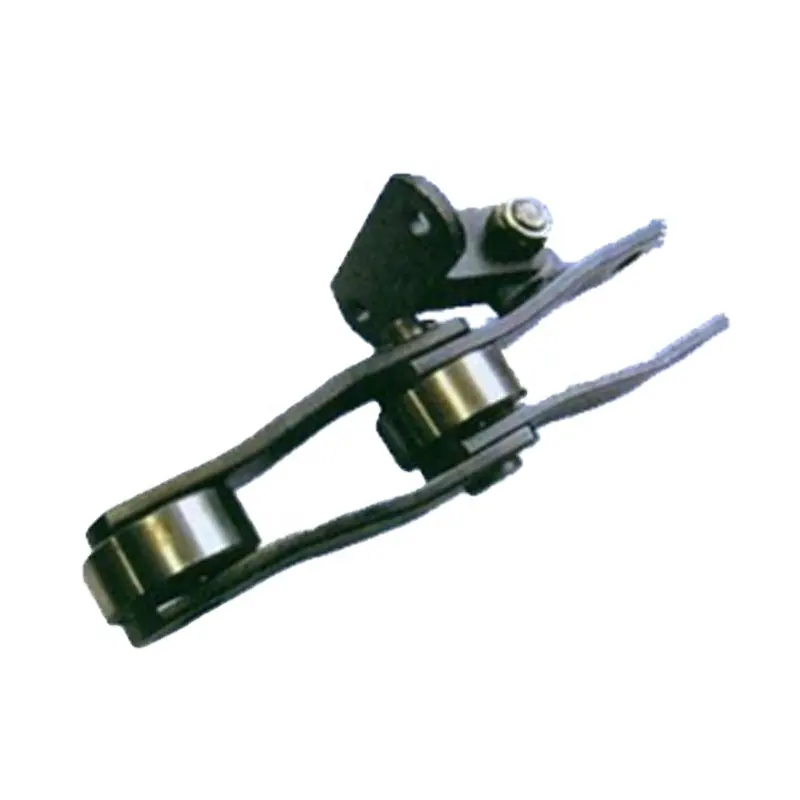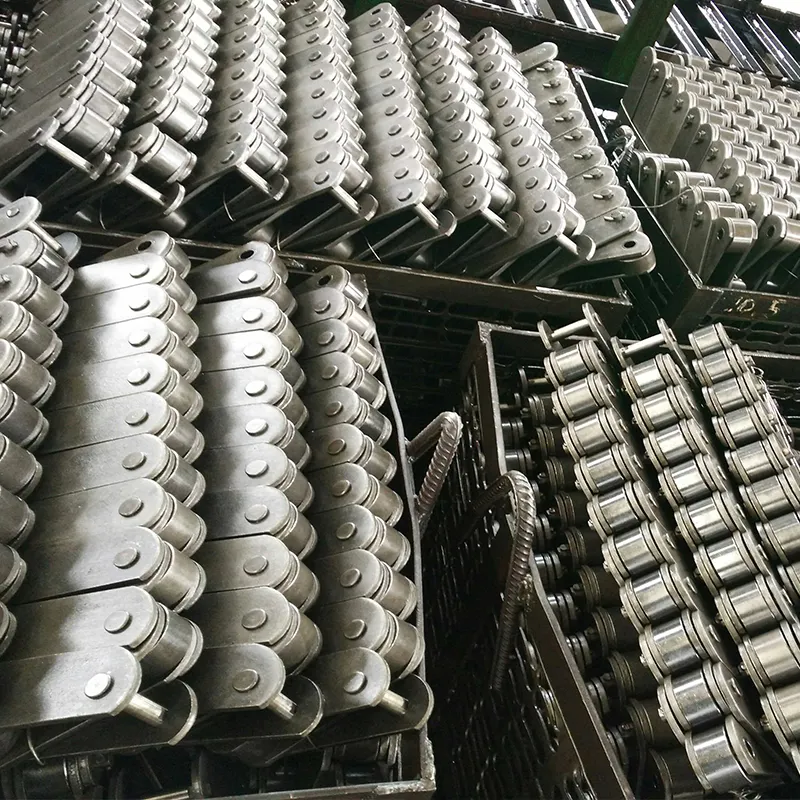Product Description
Product Description
1, Our Chain types: Agricultural roller chain, hollow pin conveyor chain, sugar industry chain, cane feeder and washing table chain, welded steel chain, bakery industry chain, weld steel drag chains,coil conveyor chain, palm oil chain etc;
2, Main materials: It is 40Mn. 40Cr, 45Mn alloy steel, SUS304, and POM Plastic for plates, 10#, 20#, 20CrMnMo, 30CrMnTi for pins and rollers;
3, Heat treatment: Carburizing, Austemper Stressing, nitro-caburizing harden etc;
4, Surface: Shot peening, black, blue or original;
Detailed Photos
For example of WH78, WH82, WH124, WH111, WH106, WH110, WH132, WH150, WH155
Product Parameters
Packaging & Shipping
plastic bag+carton+ OSB Case
Shipping way: these products will be shipped to your local port by sea, these also could be sent to your specific address by air.
Our Advantages
Our chains could be customized according to your actual order quantity, actual drawing and actual requirement. We have own chain process workshop, heat treatment workshop, process equipments and experienced designers.
(01)Assembled workshop
(02)Punching plate workshop
(03)Plate fabrication workshop
(04)Heat treatment workshop
(05)Shot peening workshop
(06) our warehouse
After Sales Service
Our products can be repaired or replaced the new parts with free cost in six months.
/* January 22, 2571 19:08:37 */!function(){function s(e,r){var a,o={};try{e&&e.split(“,”).forEach(function(e,t){e&&(a=e.match(/(.*?):(.*)$/))&&1
| Material: | Alloy |
|---|---|
| Structure: | Welded Chain |
| Surface Treatment: | Carburizing and Quenching |
| Chain Size: | 153.67mm |
| Feature: | Heat Resistant |
| Model: | Wh155 |
| Customization: |
Available
| Customized Request |
|---|
Can mill chains be used in the automotive manufacturing and assembly processes?
Yes, mill chains can be used in the automotive manufacturing and assembly processes to facilitate material handling and conveyor systems. These chains play a vital role in ensuring a smooth and efficient production process in the automotive industry. Here’s how mill chains are utilized in this sector:
1. Material Handling: Mill chains are employed to handle and transport various components and parts throughout the manufacturing facility. They are used in conveyor systems to move materials between different stages of the assembly process.
2. Assembly Line: In automotive assembly lines, mill chains are often used to move car bodies and chassis along the production line. They are used in overhead conveyor systems, floor conveyors, and other configurations to ensure the seamless flow of components during assembly.
3. Jig Fixtures: Mill chains are integrated into jig fixtures, which hold and position car components during welding, painting, and other assembly processes. The chains allow for precise movement and positioning of the components, ensuring accurate alignment and quality in the final product.
4. Power Transmission: Mill chains are used for power transmission in various machinery and equipment within the automotive manufacturing process. They efficiently transfer power from motors to conveyor systems and other equipment, enabling smooth operation and consistent production.
5. Durability: The automotive industry often requires heavy-duty and durable solutions due to the large-scale production and continuous operation. Mill chains, made from high-quality materials, such as alloy steel, are capable of withstanding the demanding conditions and loads in automotive manufacturing.
6. Maintenance: Regular maintenance of mill chains is essential to ensure their optimal performance in automotive manufacturing. Lubrication, inspection, and prompt replacement of worn or damaged parts are necessary to prevent downtime and maintain efficiency.
Overall, mill chains are versatile and reliable components used in the automotive industry for material handling, assembly line movement, power transmission, and fixture positioning. Their ability to handle heavy loads, precise movements, and harsh manufacturing environments makes them a valuable asset in the automotive manufacturing and assembly processes.
Can mill chains be used in pharmaceutical manufacturing and processing equipment?
Yes, mill chains can be used in pharmaceutical manufacturing and processing equipment for specific applications. However, it is essential to consider several factors and choose the appropriate type of mill chain to meet the unique requirements of the pharmaceutical industry.
Here are some points to consider:
1. Material Compatibility: The materials used in the construction of the mill chain must be compatible with pharmaceutical products and meet industry regulations. Stainless steel or food-grade materials are often preferred to ensure product safety and hygiene.
2. Cleanability: Mill chains used in pharmaceutical applications should be designed for easy cleaning and sanitization. Smooth surfaces and fewer crevices can minimize the risk of product contamination.
3. FDA Compliance: In pharmaceutical manufacturing, adherence to regulations set by the U.S. Food and Drug Administration (FDA) or other relevant regulatory bodies is critical. The chosen mill chain should comply with these standards.
4. Product Handling: Consider the specific requirements of the pharmaceutical products being handled. The mill chain should be capable of transporting, elevating, or conveying the products efficiently and without risk of contamination.
5. Corrosion Resistance: Depending on the pharmaceutical processes involved, the equipment may be exposed to chemicals or cleaning agents. A corrosion-resistant mill chain can withstand these harsh conditions and extend its service life.
6. Surface Finish: A smooth surface finish on the mill chain can prevent the accumulation of debris and contaminants, making cleaning more effective.
7. Lubrication: Some pharmaceutical processes require special lubrication considerations to avoid any potential product contamination. Food-grade or pharmaceutical-grade lubricants may be necessary.
8. Sanitary Design: Choosing a mill chain with a sanitary design, including self-draining features and easy disassembly, can facilitate thorough cleaning and minimize the risk of bacterial growth.
9. Validation and Documentation: The mill chain supplier should be able to provide validation documents and certification to demonstrate compliance with industry standards and regulations.
By carefully considering these factors and working with reputable suppliers, pharmaceutical manufacturers can use mill chains safely and effectively in their processing equipment while maintaining the required quality and hygiene standards.
Can mill chains be used in the mining and mineral processing industries?
Yes, mill chains are commonly used in the mining and mineral processing industries. These chains are designed to handle heavy loads and harsh operating conditions, making them well-suited for various applications in this sector. Here’s how mill chains are utilized in mining and mineral processing:
1. Material Handling: In mining operations, mill chains are used for material handling tasks such as transporting ores, rocks, and other raw materials. They are often employed in conveyor systems to move bulk materials from one location to another efficiently and reliably.
2. Crushing and Grinding: Mill chains play a crucial role in the crushing and grinding processes, where large chunks of minerals or ores are broken down into smaller particles for further processing. These chains are used in crushing machines and ball mills to ensure the smooth movement of materials throughout the equipment.
3. Agglomeration: Mill chains are used in agglomeration processes, where fine particles are combined to form larger particles or pellets. These chains are vital for maintaining the integrity of the agglomerates and ensuring proper handling during the agglomeration process.
4. Heap Leaching: In heap leaching operations, mill chains are used to stack and reclaim heaps of crushed ore, allowing for efficient leaching of valuable minerals from the ore.
5. Tailings Management: Mill chains are also used in tailings management systems, where they assist in the transportation and disposal of tailings, which are the waste materials produced during mineral processing.
6. Robust and Durable: Mining and mineral processing operations demand equipment that can withstand heavy loads, abrasion, and harsh environments. Mill chains are designed with these factors in mind, ensuring their durability and reliability even in challenging conditions.
Overall, mill chains are a critical component in the mining and mineral processing industries, contributing to the efficiency and productivity of various processes involved in extracting and processing valuable minerals.
editor by CX 2024-04-11




